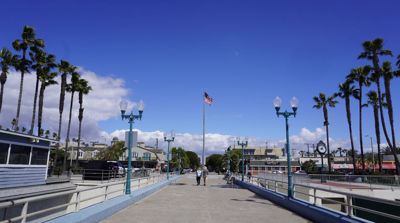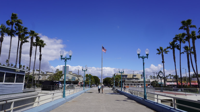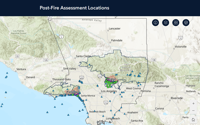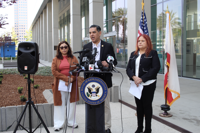
On January 23, 2025, the Huntington Beach City Council also unanimously passed an ordinance declaring itself a “non-sanctuary” city. Photo by Dan Hadar
The Mexican American Legal Defense and Educational Fund (MALDEF) filed a motion to intervene in a lawsuit challenging the California sanctuary law, which prohibits local police from investigating, interrogating or arresting people for purely immigration enforcement purposes and limits police cooperation with federal immigration officials.
MALDEF announced that it will be intervening as defendants on behalf of the National Day Laborer Organizing Network (NDLON), an organization working to expand equity and civil and political rights to day laborers, migrants and low-wage workers.
Jumping into the case
MALDEF attorneys argue that NDLON’s work and advocacy efforts would ultimately be jeopardized by the repeal of the California Values Act (CVA) or Senate Bill 54, which, as previously explained, prohibits law enforcement and other officials from helping the Border Patrol or ICE arrest and deport undocumented people.
The law, passed in 2017, is currently being challenged by City of Huntington Beach.
MALDEF, the nation’s leading civil rights organization, looks to join the legal battle in support of other state leaders claiming that Huntington Beach, a place where approximately 38,100 people identify as Hispanic or Latino, should abide by sanctuary laws protecting undocumented immigrants.
MALDEF joined the case not just for the protection of immigrants but also because of their interest in aiding laborers from unconstitutional searches by law enforcement. They argue that the loss of immigrant protections in California could increase interactions between police and day laborers and other immigrants that end in deportations.
The motion also states that by allowing police, like those of Huntington Beach, to work with institutions like ICE could make immigrants less likely to seek help from law enforcement or report crimes.
“California has chosen, through democratic processes, to ensure that peaceful, law-abiding immigrants can live without fear of local police complicity in violations of constitutional rights guaranteed to all persons, such as due process and equal protection,” Thomas A. Saenz, MALDEF president and general counsel, said.
Huntington Beach and immigrant protection
The City of Huntington Beach, the city council, their police department and the police chief sued the state of California, Governor Gavin Newsom and Attorney General Rob Bonta earlier this year, challenging SB 54, saying that the law forces the city to violate federal immigration law and the U.S. Constitution’s requirement that state law yield to federal law.
“As a matter of law, the state’s 'sanctuary state law' is unconstitutional and violates other federal laws; as a matter of enforcement policy, it is a clear and present danger to the health, safety, and welfare of the City of Huntington Beach,” the lawsuit read.
On January 23, 2025, the Huntington Beach City Council also unanimously passed an ordinance declaring itself a “non-sanctuary” city. This ordinance was introduced by Mayor Pat Burns.
“We need every law enforcement effort, whenever called upon, whether it be fighting terrorists, whether it be fighting purse snatchers, or whatever it is, we have to have every law enforcement tool to best serve our citizens,” Burns said in January.
Chris Newman, NDLON legal director, said SB 54 is currently one of the most effective barriers California has to guard against the Trump administration’s “dangerous war against immigrants.”
“We will not permit Huntington Beach to take the state backward. While Trump and his accomplices seek to terrorize immigrants, to silence them and deprive them of their constitutional rights, we will ensure that immigrant workers’ voices are heard in federal courts,” Newman said. “We will defend a law that has prevented deportations and improved public safety for all Californians. Like Trump, Huntington Beach officials might believe they can bully immigrants to show they are above the law, but they are wrong. This litigation will propel efforts that strengthen SB 54, and we will defend the rule of law itself.”
Despite SB 54's current restrictions on law enforcement's ability to work with federal ICE officials, the motion notes that this could change, particularly in light of the 2026 gubernatorial election. Attorneys stated in the motions that the defense of SB 54 by the state could soon be left under great uncertainty.
“It’s obvious that Huntington Beach just wants another bite at the apple, but the CVA has already been upheld in state court and by the Ninth Circuit,” said Eduardo Casas, MALDEF staff attorney.
Casas said that Huntington Beach's complaints are based on unfounded allegations that undocumented immigrants do not pay taxes, drain public resources and drive crime rates.
But as CALÓ News recently reported, in California, undocumented immigrants contributed $8.5 billion in state and local taxes in 2022. According to the California Budget and Policy study, the number would only increase to at least $10.3 billion if undocumented taxpayers were granted work permits.
“Municipalities like Huntington Beach are trying to create a link between immigration status and propensity for crime, where there is none,” Casas said.
On Monday, an appeals court denied Huntington Beach’s request in its federal lawsuit challenging California housing law, which mandates local governments to meet and build units for affordable housing, something the city then said was unconstitutional.
“We are pleased that Huntington Beach’s latest attempt to exempt itself from our state’s housing laws has failed. All along, Governor Newsom and I have asserted that the city’s federal lawsuit is meritless and a waste of the public’s money,” Bonta said on Monday. “Like every other city in California, Huntington Beach has a legal obligation to build its fair share of housing.
He said the state will closely monitor the city’s next step. There is also a lawsuit against Huntington Beach from the state that is pending an appeal.
Past wins
This is not the first time MALDEF and NDLON have challenged a California city’s anti-immigrant position and come face-to-face with a majority-white city.
In 2004, MALDEF and NDLON sued Redondo Beach, representing day laborers. The lawsuit challenged the city’s anti-solicitation ordinance as a violation of the First Amendment free speech rights of day laborers. It was illegal to stand on the sidewalk and approach a driver of a motor vehicle and ask for a job, business, or donation under the city's previous anti-solicitation law. The partnership won a critical victory in “Comité de Jornaleros de Redondo Beach v. City of Redondo Beach” in 2012.
“No city, acting on wholly unfounded stereotypes and biases, should threaten that state guarantee, or we risk creating a society with ongoing inter-community rifts and arbitrary government actions,” A. Saenz said.
To read the full motion of MALDEF’s intervention, click here.











(0) comments
Welcome to the discussion.
Log In
Keep it Clean. Please avoid obscene, vulgar, lewd, racist or sexually-oriented language.
PLEASE TURN OFF YOUR CAPS LOCK.
Don't Threaten. Threats of harming another person will not be tolerated.
Be Truthful. Don't knowingly lie about anyone or anything.
Be Nice. No racism, sexism or any sort of -ism that is degrading to another person.
Be Proactive. Use the 'Report' link on each comment to let us know of abusive posts.
Share with Us. We'd love to hear eyewitness accounts, the history behind an article.